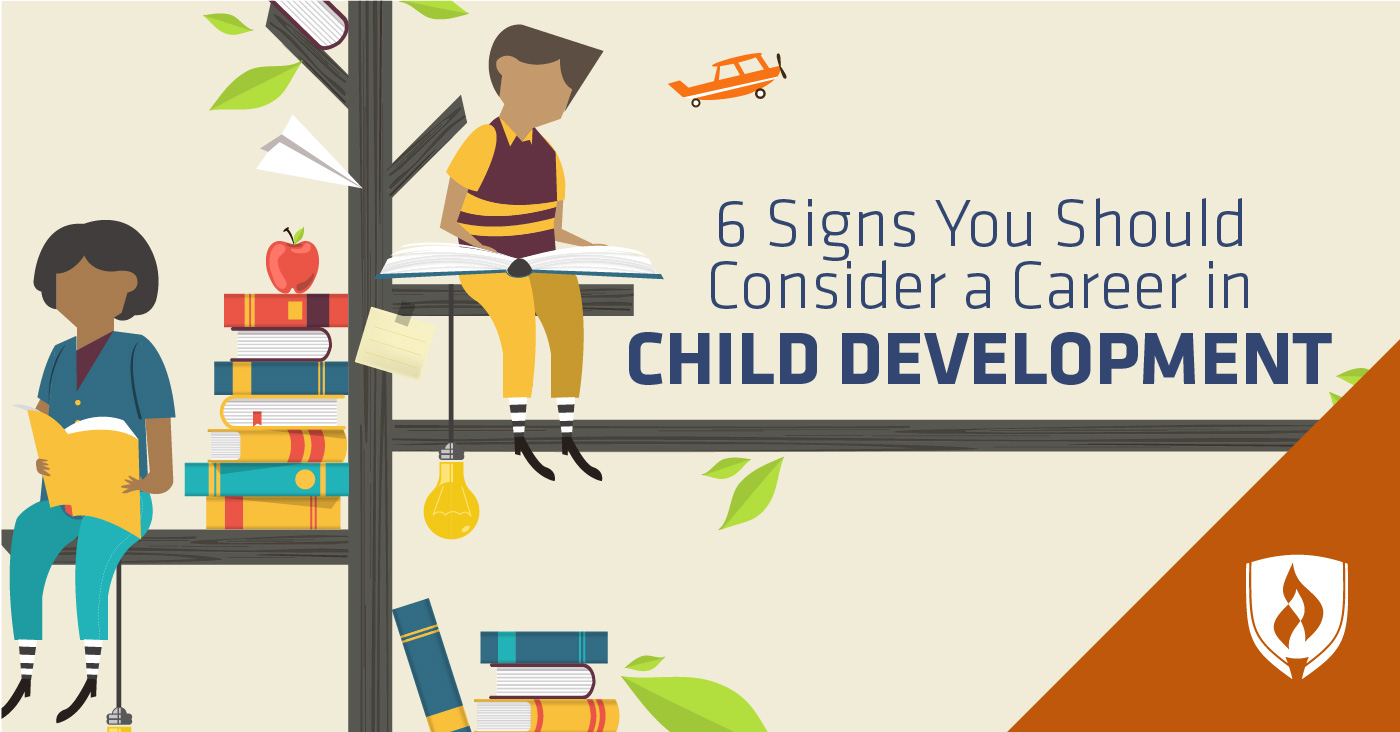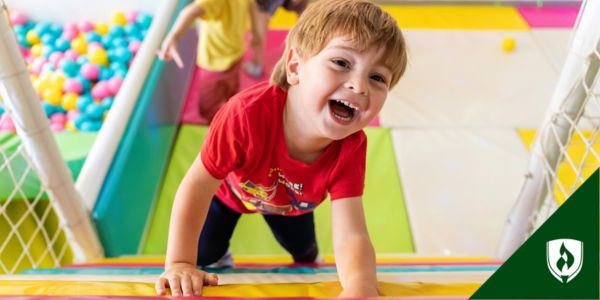
You’ve always had a knack for working with kids, and you’ve been told your endurance rivals that of the Energizer Bunny. Or maybe you’re tired of your job search, wishing you could just spend time focusing on what really matters—raising your children. But you still need the extra income.
All of this has you wondering whether a career in child development could be the perfect solution. You could pour your soul into helping little ones grow and earn a paycheck along the way.
It seems childcare is always in demand, but not everyone can handle raising children. As rewarding as the work is, it can also be taxing. So how do you know if you have what it takes to succeed in the field?
We enlisted some experts to help us identify some telltale signs of someone who would thrive in a child development career. Take a look at the list below and see if you have the natural qualities to help educate and empower our next generation.
You may be destined for a career in child development if …
Not everyone was born with the gift of working with kiddos. Aside from having an interest in assisting children, here are six other important traits according to child development pros.
1. You thrive on routine
Do you have your little ones’ naptimes down to a science? Do you know exactly when you’ll need your morning cup of coffee or a snack to help you power through the afternoon? This circadian rhythm is a great asset for child development professionals, as consistency is critical for young children.
There is so much in our world for little ones to discover, but learning is most effective under the right conditions. Making sure children have the food and rest they need is essential. Developing and enforcing a consistent routine helps children prepare for their day.
If they come to expect that playtime comes before lunch and story time precedes naptime, there is less room for argument. This results in less time devoted to disciplining and more time for developing skills.
It will inevitably take some time for children to adopt the routine, but once they do, your work as an early childhood educator will become much simpler. So having this innate need to follow a schedule in your own life will definitely come in handy in the profession.
2. You relish opportunities
Do you go out of your way to find ways to make someone’s day? Do you take time to say “thank you,” or to bring snacks to share with coworkers or friends? Do you think about what teachable moments might arise for your children? These are all signs that you are very intentional and make the most of any given opportunity—a quality that can be leveraged in child development.
Every day is full of new things to discover—especially for children. Child development professionals must understand what the child should be learning and how they should be learning it, depending on their age range. Young children often benefit more from hands-on, situational learning, as opposed to rigid lessons from a book.
“Kids need love, guidance and lots of opportunity for imaginative play and physical exercise in the fresh air,” says Cindy Faye, a former daycare provider and preschool teacher.
Once you have identified a lesson you’d like to teach, imagination kicks in and little, everyday moments become educational opportunities. Paying attention to how children interact with one another can provide occasions to teach kindness, sharing, listening, hygiene and many other important lessons for little learners.
3. You’re very perceptive
Do you enjoy reading people and figuring out what makes them tick? Do your friends often come to you for help with their problems? You like to find solutions after thoroughly diagnosing situations. You’re naturally observant and analytical, which will serve you well in a child development career.
Not all children learn at the same speed—some will need extra help in certain areas that others won’t. As an early childhood educator, it’s your job to notice when a child may need require some extra attention.
“You need to know what to look for at different ages—what is the norm? Then you can identify what is below or exceeds the norm,” explains Becky Trossen, who’s spent years working in special education and behavioral intervention. “You need to be a good observer and go beyond the seemingly obvious reasons to determine what the child's real issues in learning are.”
Your perceptive eye will also help you to determine when a child’s behavior is merely “kids being kids” or if there is a more serious underlying issue. Young ones exhibit many behavioral issues that are completely normal, but it’s up to child development professionals to identify when it’s something more.
4. You’re a kinesthetic learner
Do you have trouble comprehending something until you can actually get your hands on it? Do you insist on trying something yourself rather than taking someone’s word for it? When it comes to learning, you believe practice makes perfect, and there’s no better way to understand a new concept than diving in headfirst.
You’re probably well aware that working with children is no desk job—it takes energy and stamina. It is especially appealing to those who enjoy hands-on activities. Young children are the same in that it’s difficult for them to process abstract information. But once they get involved and try it firsthand, a light bulb goes on and they suddenly understand. There’s nothing more magical than seeing that look in the eyes of a youngster—especially when you helped create that moment.
So rather than talking about the wind, help them experience it by making their own pinwheel weathervanes. Instead of reading about rhythm and vibrations, let them experiment by creating different tones with homemade tissue box guitars. Your innate ability to bring lessons to life will work wonders in the minds of young ones.
5. You’re exceedingly patient
Can you keep your cool during situations where others tend to lose it? Are you able to tolerate taking a little extra time to let your child attempt to tie their own shoes? Patience doesn’t come naturally for everyone, but it is an essential aspect of working in child development.
No matter how simple a lesson may seem, there will inevitably be a few kids who just don’t seem to grasp it until the fifth or sixth time. As a child development worker, you should expect to repeat yourself often and come up with a few creative ways to teach the same concept. Kids learn at different speeds and in different ways, so a little patience will go a long way.
As you are well aware, children can also be notoriously slow at seemingly simple tasks. But waiting an extra five minutes for bathroom break or watching a child take an unusually long time to put on winter boots won’t faze you a bit. This is yet another sign of a great child development professional.
6. You embrace your silly side
Do you like to dance around the kitchen while getting ready for dinner? Are you always up for a goofy dress up session with your little ones? You’re not too proud to act a little crazy in the name of fun, and that is an essential trait of a great child development worker.
Children have wild imaginations and think of the craziest ways to express themselves. In order to be an effective educator, you’ll have to keep up with their wacky ways. When adults can get on the same level as little ones, it’s not only more fun for them; it can also enact a sense of trust.
Inventing funny games and silly songs to help children learn and interact can leave a lasting impression on them. So if you have a high tolerance for fun and are not easily embarrassed, consider this a perfect career fit.
Think you have what it takes?
There’s a reason you were drawn to a career in child development. If you can relate to some of the important characteristics listed above, you might be naturally inclined to work in the field. Once you acquire the practical knowledge and hands-on training to accompany your existing abilities, you’ll be ready to lead the next generation.
Get a sneak peek into what this training might entail in our article: 5 Fascinating Child Development Courses You Can Look Forward to.
RELATED ARTICLES:
- 4 Reasons You Can’t Ignore the Importance of Early Childhood Education
- Experts Explain How to Support Kids Through the Stages of Child Development
- What Can I Do With an Early Childhood Education Degree?
- The Real Problem with Pre-K: Digging into the Quality Gap
- Preschool Readiness: How to Be Confident Your Kid is Ready to Conquer the Classroom
- 5 Practical Preschool Teacher Skills You May Already Possess




